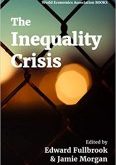Read More »
Is economics value-free?
from Lars Syll I’ve subsequently stayed away from the minimum wage literature for a number of reasons. First, it cost me a lot of friends. People that I had known for many years, for instance, some of the ones I met at my first job at the University of Chicago, became very angry or disappointed. They thought that in publishing our work we were being traitors to the cause of economics as a whole. David Card Back in 1992, New Jersey raised the minimum wage by 18 per cent while its neighbour...
Read More »The algorithms of wealth accumulation
from Ikonoclast (originally a comment) Capitalism is already an algorithmically determined system on the financial economy / financial accounts side and it has been so at least since the 1850s. The axioms and algorithms of private property, income, finance and national accounting determine the vectors of wealth/money flows and the depositories of wealth/money stocks, all as denominated in the numéraire. This is not to devalue the thesis of machina-economicus. Indeed it magnifies the...
Read More »Economists have no ears
from Steve Keen Thomas Kuhn once famously described textbooks as the vehicle by which students learn how to do “normal science” in an academic discipline. Economic textbooks clearly fulfil this function, but the pity is that what passes for “normal” in economics barely deserves the appellation “science”. Most introductory economics textbooks present a sanitised, uncritical rendition of conventional economic theory, and the courses in which these textbooks are used do little to counter...
Read More »Open thread October 27, 2020
Cash industry association ESTA contradicts EU Advocate General on the right to pay in cash
from Norbert Häring ESTA, the association of European cash management companies, has published a position paper contradicting the assessment of the EU Advocate General of my case before the European Court of Justice regarding the right to pay my broadcasting fee with the legal tender, cash. The opinion of the Advocate General is a recommendation to the highest EU court. The Advocate General has more or less adopted the anti-cash stance of the EU Commission. The Board of ESTA, in its...
Read More »Reforming economics
from Lars Syll The typical economics course starts with the study of how rational agents interact in frictionless markets, producing an outcome that is best for everyone. Only later does it cover those wrinkles and perversities that characterise real economic behaviour, such as anti-competitive practices or unstable financial markets. As students advance, there is a growing bias towards mathematical elegance. When the uglier real world intrudes, it only prompts the question: this is all...
Read More »Yes, there is a Republican ideology. That is the problem . . .
From the NYT editorial board: Of all the things President Trump has destroyed, the Republican Party is among the most dismaying. “Destroyed” is perhaps too simplistic, though. It would be more precise to say that Mr. Trump accelerated his party’s demise, exposing the rot that has been eating at its core for decades and leaving it a hollowed-out shell devoid of ideas, values or integrity, committed solely to preserving its own power even at the expense of...
Read More »Sunday morning rituals
from Lars Syll One of yours truly’s Sunday morning rituals is reading the obituary column of The Telegraph. This obit is rather typical: Peter Scott, who has died aged 82, was a highly accomplished cat burglar, and as Britain’s most prolific plunderer of the great and good took particular pains to select his victims from the ranks of aristocrats, film stars and even royalty. According to a list of 100 names he supplied to The Daily Telegraph, he targeted figures such as Soraya Khashoggi,...
Read More »Contemporary inequality is a challenge to economics
from Peter Radford and The Inequality Crisis The challenge of contemporary inequality is not just to the cohesion of modern society it is also a challenge to economics, because it is economics and its values that sit squarely within the social framework that has allowed inequality to become so pervasive and debilitating. We have built a society resting on only one view of liberty and equality, that of the economic sphere, rather than on a more holistic view that allows the inclusion of...
Read More » Heterodox
Heterodox





